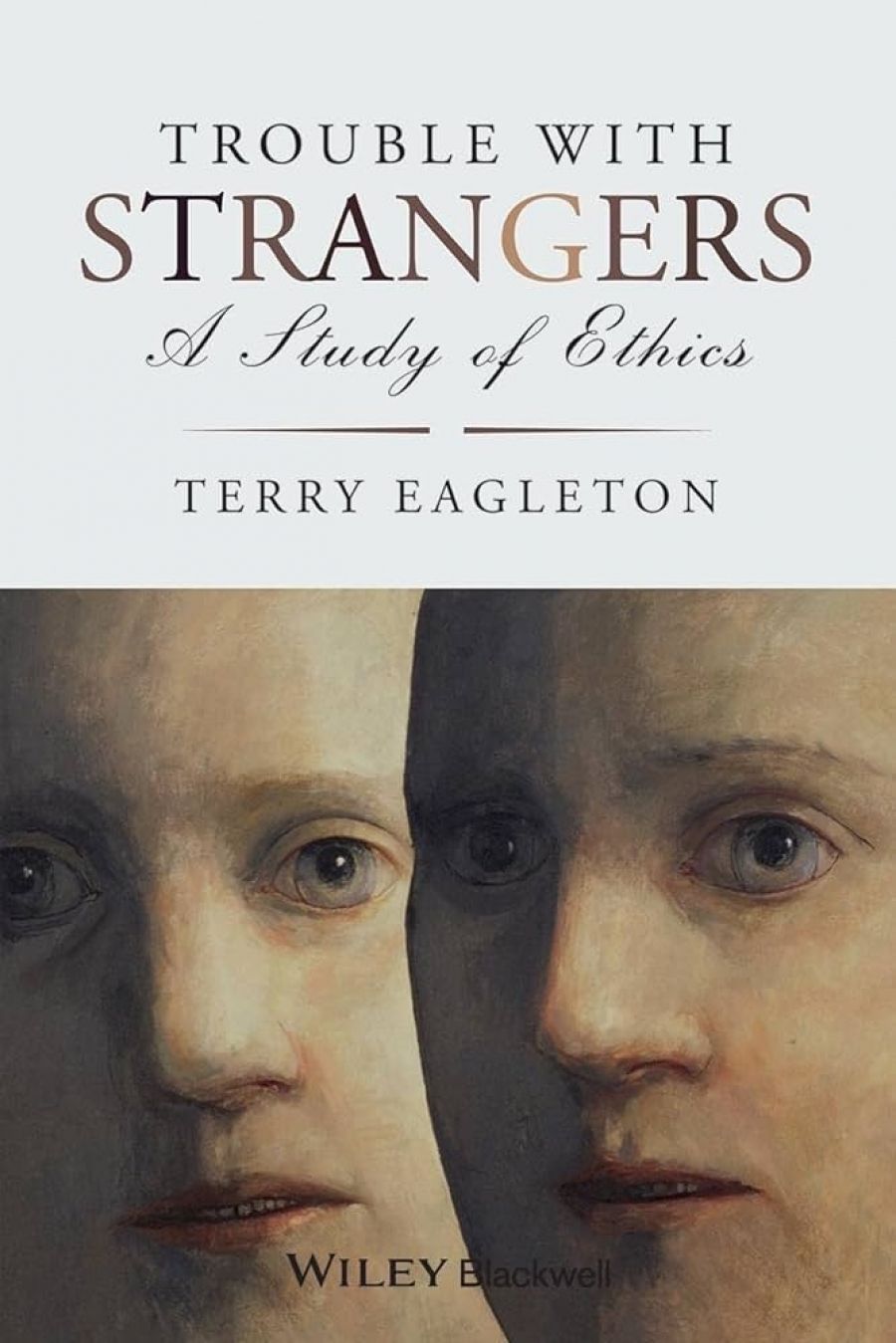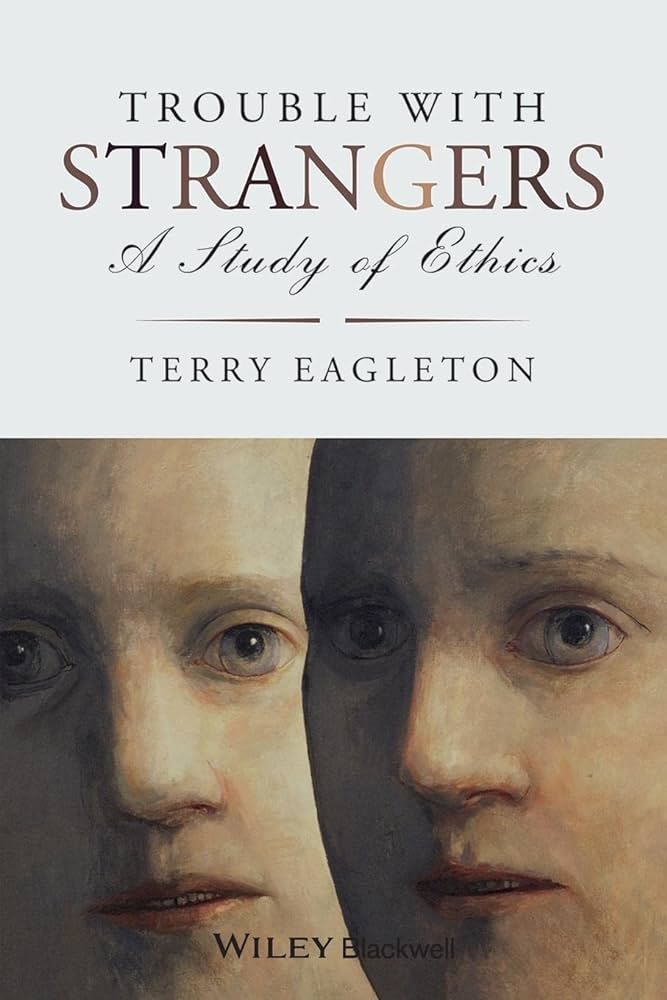
- Free Article: No
- Contents Category: Philosophy
- Review Article: Yes
- Article Title: The Eagleton committee
- Online Only: No
- Custom Highlight Text:
Terry Eagleton has been widely hailed as Britain’s most important contemporary literary critic. He is surely that, and a great deal more besides.
Marxist maverick, cultural theorist, budding novelist and playwright, he was for many years the Thomas Warton Professor of English Literature at Oxford University. Having traded Oxford for the University of Manchester in the early 2000s, Eagleton has roamed the globe over recent years, speaking on such lofty topics as postmodernism, deconstruction, and Lacanian psychoanalysis.
- Book 1 Title: Trouble With Strangers
- Book 1 Subtitle: A study of ethics
- Book 1 Biblio: Wiley-Blackwell, $49.95 pb, 347 pp
- Book 1 Cover Small (400 x 600):

- Book 1 Cover (800 x 1200):

Eagleton is a rare bird in the world of High Theory. Unlike the solemn, obtuse preaching of many contemporary theoreticians, he is witty, entertaining, and politically provocative. His prolific output continues to astonish, to the glee of his admirers and the dismay of critics. His thirty or so books, with titles such as The Illusions of Postmodernism (1996), Sweet Violence: The Idea of the Tragic (2002) and Holy Terror (2005), effortlessly interweave Continental theory and the resources of literature. There are certainly few critics who can leap in a single paragraph, as Eagleton routinely does, from Dostoevsky to Derrida, Wordsworth to Wittgenstein, St Augustine to Adorno.
His sweeping intelligence scoops up everything from Euripides to the European Union, and it appears there is no topic that is not grist to his intellectual mill. His masterwork, The Ideology of the Aesthetic (1990), offered a remarkable dialectical interrogation of the aesthetic realm as an end-in-itself. A trilogy on Irish culture – Heathcliff and the Great Hunger: Studies on Irish Culture (1996), Crazy John and the Bishop and Other Essays on Irish Culture (1998), and Scholars and Rebels in Nineteenth-Century Ireland (1999) – charted new cultural pathways for Irish literature. Alongside these intellectual undertakings, Eagleton managed to find the time to write the screenplay for Derek Jarman’s film Wittgenstein (1993) and also penned a best-seller, The Truth about the Irish (2001).
In his memoir, The Gatekeeper (2001), Eagleton reflected thus on his own ‘over-productivity’: ‘Whereas other academics worry about not being productive enough, my embarrassment has always been the opposite. Instead of finding myself unable to write books, I find myself unable to stop, to the point where some people have wondered whether I am actually a committee.’ Hardly a comment designed to win over academics. But Eagleton’s ambitions have long extended beyond the academy; he is rather a peddler of ideas to the well-educated. In this latest offering, he has swapped aesthetics for ethics and Marxism for psychoanalysis, in a work that is part academic treatise and part self-help manual.
In Trouble with Strangers: A Study of Ethics, Eagleton fixes his critical eye firmly on the question of ethics. Reviewing ethical theories from Aristotle and Kant to the contemporary departures of Slavoj Žižek and Alain Badiou, he asks ‘what chance ethics?’ in a world increasingly organised around power, prestige, and panic. What binds society together, says Eagleton, is ethics. But there are different species of ethics – different kinds of moral reasoning, as it were – and unravelling these is one of the central objectives of Trouble with Strangers.
Morality, truth, justice, ethics: these are topics which Eagleton has been increasingly drawn to in recent years.
What makes Trouble with Strangers different from his other offerings, however, is an insistence that ethical theories can best be interpreted through recourse to the work of Freud’s French interpreter, Jacques Lacan. From the Judaeo-Christian tradition to the ethics of socialism, says Eagleton, Lacan’s three psychoanalytical categories of the ‘imaginary’, the ‘symbolic’ and the ‘real’ orders of psychic life are of essential importance to assessing the strengths and defects of different types of moral thought.
If this turn to psychoanalysis seems an odd conceptual move from one of the world’s leading Marxist theoreticians, it is, from another angle, entirely to be expected. For some years now, Eagleton has been increasingly drawn to the insights of Freud and to psychoanalysis. In a sense, then, Lacan has come to supplement Lukacs in Eagleton’s left politics.
And a welcome development this is, since psychoanalysis seems to provide Eagleton with a keen sense of the personal tribulations of morality and ethical communality. An ethics of personal engagement and sympathy; an ethics of impersonal duties and moral obligations; and an ethical orientation based on death and mortal transformation: these are the core trajectories charted by Eagleton through the lens of Lacanian psychoanalysis.
Psychoanalysis offers a special kind of vantage point on ethics, partly because it captures the doubled sense in which individuals become conscious of their obligations to others whilst simultaneously remaining unconscious of their deepest narcissistic desires. It was Freud who observed that one’s neighbour offers both our first gratifying experience and our first hostile one, the entwining of love and hatred. This Freudian notion of identity cum antagonism lies at the centre of Eagleton’s thesis that ethics disturbs and derails. If the cornerstone of psychoanalysis is a human subject split between conscious reflection and repressed desire, then the world of ethics is not a dissimilarly troubled one.
Beginning with eighteenth-century sentimentalism and English moral philosophy. Eagleton pursues the thorny question of how various moral codes sequester psychic experiences of conflict, fissure, and fragmentation. Ranging from David Hume through Edmund Burke to Adam Smith, he details what he calls ‘the imaginary ethics’ of English culture. These were moral codes in which life was lived artfully and morality practised virtuously – with lightness, polish, geniality, and ease of manner. In this calm morality, Eagleton finds more than a hint of Lacan’s theory of the imaginary, in which others are primarily experienced in a ‘mirroring’ kind of way, and in which sociality (and thus ethics) is cast as a matter of unity, harmony and plenitude.
If morality is drearily bourgeois from this angle, it appears as altogether more zealously robust and disciplined from another. Investigating conceptions of human rationality, freedom, and formal procedures of law from the vantage point of a moral universalism, Eagleton finds an altogether more abstract, impersonal, regulated promotion of ethics in continental Enlightenment philosophy. Here he appraises the celebrated moral law of Immanuel Kant, considering how the whole business of ethics is shifted to the ‘symbolic injunctions’ of procedures, duties, rules, disciplined conduct. At its best, ‘symbolic ethics’ – which runs in a celebrated tradition from Kant to Jurgen Habermas – expresses a realist bent, concerned as it is with legality and universality. At its worst, though, it strikes Eagleton as conformist, utilitarian, shallow and passionless.
Fortunately, the story does not end with morality as abstract duty. For ethics also has a kind of excessiveness about it. A mature ethics, says Eagleton, involves a permanent state of crisis, a condition in which we are rendered outof-joint, displaced, even traumatised. It probably comes as no surprise that Eagleton traces this traumatic core of morality to French radical thought, in which ‘the Other’s ethical demand’ bursts miraculously onto the scene as unfulfillable, inarticulable, infinite and excessive.
That contemporary French philosophy’s obsession with the singular, enigmatic Other of ethics remains, in Eagleton’s account, aloofly indifferent to community, consensus, reciprocity and universality tells us something about his scepticism regarding the ethical thought of writers such as Levinas, Derrida, and Badiou. He is perhaps at his best, and certainly most provocative, when he directly interweaves philosophy and politics. As he writes: ‘What one might loosely call post-structuralist or postmodern ethics reflects among other things a massive failure of political nerve on the part of a European intelligentsia confronted not only with the formidable power of global corporate capitalism, but still languishing guiltily in the long shadow of the Gulag and the gas chambers.’
Trouble with Strangers is a polyphonic work of theory, mixing different conceptual accents, psychoanalytic registers and philosophical idioms. It is hugely ambitious in scope, and many readers will marvel at how Eagleton weaves Lacanian psychoanalysis in and out of the ethical reflections of philosophers as various as Spinoza, Schopenhauer, Kierkegaard and Nietzsche. But if the form of the book is experimental, its content is relentlessly modish. For the book is unremittingly au courant in its choice of theorists, especially from the contemporary period, as Eagleton rehearses (as he has in previous writings) the contributions of Žižek, Derrida, Levinas and Badiou. For those who have followed Eagleton’s career with any degree of interest, there is a sense of the familiar here. Indeed. one can only wonder how Eagleton’s Lacanian-inspired ethical classifications might be stretched if asked to cope with the ethical investigations of, say, Italian social theorist Georgia Agamben, Polish sociologist Zygmunt Bauman or Brazilian philosopher Roberto Unger.
Despite these quibbles, Eagleton has laboured diligently in tracing the wellsprings of ethics across literature, philosophy, morality and religion. Trouble with Strangers is an engrossing book, peppered with remarkable insights into theory, philosophy and psychoanalysis. To be able to live well, concludes Eagleton, requires active engagement with today’s deadly worlds through one’s own crafted ethics. And in the end ethics always exceeds morality. In a nutshell, Eagleton’s philosophical position might be paraphrased thus: I am defeated almost daily by morality; yet to ethics I am born.


Comments powered by CComment